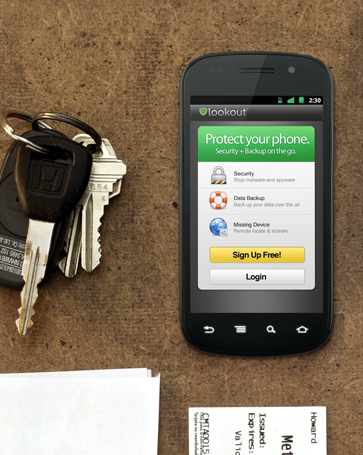
As smartphones gradually become more PC-like and more consumers hop on the bandwagon, security threats become more of a problem. Malware and Trojan applications slip into the open Android Market, often undetected. Fortunately, Google is typically quick to respond to user reports of such, but they still slip through the cracks, leaving hundreds of thousands – even several millions – of users potentially at risk. This says nothing for mobile hacking, phishing websites, SMS attacks or the other security threats out there that are only growing in intensity.
Of course, a handful of mobile security options have spawned as a result. Popular PC security options like Norton, Kaspersky and McAfee have made the jump to the mobile world, as well as newcomers, Lookout Mobile Security, who have made a name for themselves. As you would expect, they all offer some sort of free trial or a "lite" version which limits the features. On top of that, they all offer a premium security service that isn't too different from their PC offerings.
Lookout is a perfect example of where mobile security goes wrong. Free Lookout users will get anti-virus, anti-malware, anti-spyware protection, contacts backup, data restore to existing phone, find phone (locate and scream) and standard customer support. In addition, premium users are treated to blocked phishing and malicious websites, Privacy Advisor, photo and call history backup, transfer backed up data to a new phone, remote wipe/lock and premium customer support. The Premium features can be enabled via in-app purchase in the free app and will run users $29.99 per year or $2.99 per month. The others vary in service, but the offerings are all generally the same and roughly the same price.
This poses a problem. PC users feel they need security and anti-virus protection – mainly because they do. The chances of you getting an infected computer after a few months of use without protection are pretty high. Those odds aren't quite there on Android yet. They will be given a few more years to mature, but the majority of users aren't looking that far into the future. Smartphones and tablets are a different breed of devices and have spawned a different breed of consumers with an entirely new mindset, especially in terms of software and apps, that will be hard to change: more for less.
Take a look at mobile gaming for example. New games for dedicated portable consoles like the Nintendo DS or Sony PSP run about $20 to $40. In contrast, mobile games for smartphones are much easier to pick up and play in a pinch and cost anywhere from $0.99 to, on rare occasion, $15. If a developer were to put a full-fledged portable game, comparable to that of a PSP game in Android Market or Apple's App Store, for much over $10, users would scoff at the price and pick something like Infinity Blade instead. Smartphones and tablets are suffocating other mobile gaming endeavors.
This $30 subscription price has had quite a few people laughing it off, too. Just go check out the comments for any given security app. Even in the handful of comments I read through, there were a lot of displeased customers who felt like they overpaid for the service.
These mobile security companies are asking for $30 per year and are stuck in the PC era while only few have the right idea. AVG Mobilation's Anti-Virus Pro offers most (if not more) features than the others for a one-time fee of $9.99 (it's currently on sale for $4.99). This begs the question: why anyone would pay for a subscription, even if the others do offer another feature here and there? Is instant photo and contact backup worth $20 more (and $30 each subsequent year)? Photo backup is offered by several different applications (i.e.: Google+ instant upload) and contact backup is an included feature in Android. Even remote lock, wipe and ring are offered for free to HTC customers.
Norton, Kaspersky and McAfee will have to offer similar prices, ad-supported versions for a discounted price or bundled packages with PC software, too. Even Lookout needs to reevaluate their pricing structure. Otherwise, people will either flock to services like AVG and other alternatives or simply go unprotected.
I'm curious, readers. Do any of you pay for premium smartphone (or tablet) security? Or do you use a lite version? Any at all? Could you see yourself ever paying $30 per year for mobile security? It's a relatively low price, but in comparison to other smartphone software and services, it's fairly steep. Give us your thoughts below!
Image via Lookout